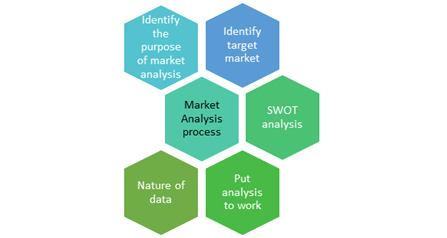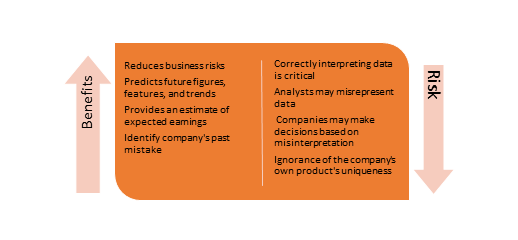What is the meaning of market analysis?
A market analysis is a comprehensive examination of a market within a particular sector. It aids in the comprehension of potential consumer segments and their purchasing habits, market volume, competitive positioning, and the overall economic situation, including entry barriers and business regulations.
The market analysis acts as a foundation for making decisions. Information is gathered and analysed from suppliers and customers to make purchasing and sales decisions, as well as to assess the existing demand and explore new opportunities.
Summary
- Information about markets, consumers, rivals, and other business variables can be found through market analysis.
- Market analysis is used as a foundation for decision-making.
- Market analysis reduces business risks, identifies company's past mistake, predicts future figures & features.
Frequently Asked Questions
What is the significance of performing the market analysis?
Market analysis is a big part of market research. Companies consider market analysis to decide the best course of action when making a critical business decision, implementing a strategic plan and presenting details about the market in which they will be functioning.
By performing market analysis, the questions listed below should be answered.

Source: Copyright © 2021 Kalkine Media Pty Ltd
How to conduct a business market analysis?
Although performing a market analysis is not a difficult task, it does necessitate extensive research, so plan on devoting a considerable amount of time to it. To conduct market analysis, the steps listed below should be taken.
- Identifying the aim of market analysis
Market analysis is carried out by companies for several purposes. Identifying market risks, reducing conflicts, creating opportunities, looking back at past problems to minimise potential risks, and analysing past successes to see what needs to be done in the future are all important to the company's success.
- Identifying the target market:
Few people on the planet would be considered buyers, so attempting to persuade everyone to purchase the product is a pointless exercise. By conducting a target market analysis, we can determine who is most likely to want the product, as well as the market size, who the consumers are, where they come from, and what factors will affect their purchasing decisions.
Here are some factors to note when doing a target market analysis.
- Customer's persona - An explanation of the average age, gender, education, occupation, marital or family status,and income of a potential customer would provide picture-perfect information on the customer. After determining who the consumers are, it is necessary to analyse their desires, preferences and behaviours.
- Place - Consumers are segmented by nation, area, state, city, and county. By conducting a location analysis, the company can find the ideal location to launch its business.
- Market size - The market size of a new product or service is determined by the number of potential customers.
- Personality traits - It is necessary to gain insight into the minds of potential customers, to understand their desires, and to predict how they will respond. Learn about the personality traits of potential customers, their favourite and least favourite items, and their way of life. The more knowledge gathered about potential customers, the better the chances of the company's success.
- Latest trends - Consumer behaviour is constantly changing. The new market trend will be discovered by analysis.

Source: Copyright © 2021 Kalkine Media Pty Ltd
- Understanding competition through SWOT analysis
Understanding the competition is important for more market analysis. Consider items like competitors' products, venue, ideal customer, and business disadvantages. It is necessary to understand why a consumer chooses a competitor's business and the danger it poses to their business.
To evaluate the company's marketing stance and benefits, make a list of all major competitors and describe their strengths, weaknesses, opportunities, and threats (SWOT analysis).
- Nature of data to be obtained
The importance of information in market analysis cannot be overstated. To support analysis and make decisions based on reliable information, the data should be impartial, meaningful, and factual.
- Put market analysis into practice
After gathering all of the data and ensuring its accuracy, it is necessary to evaluate the data to make it useful. Customer purchasing patterns, a business forecast, consumers' readiness to pay for a product or service, industry size and growth rate, cash flow, target customers, and the outcomes of other analyses should all be included in the research.
Once the market analysis has been completed, it is time to put it to use for the company’s success. Look for ways to apply the analysis and findings to enhance the business, compare the findings to those of other companies before implementing, and organise research data into an easily readable and digestible document.

Source: Copyright © 2021 Kalkine Media Pty Ltd
What are the advantages of market analysis?
- The market analysis not only reduces business risks but also helps companies identify major market trends, industry players, and what it takes to succeed.
- Most marketing reports include a market forecast, which predicts future figures, features, and trends in the target market. This provides an estimate of expected earnings, enabling the business plan and budget to be adjusted accordingly.
- Marketing analytics can help to understand why a company made a mistake in the past. In-depth analytics, for example, may explain what factors influenced a product's selling or why a particular metric worked the way it did.
What are the disadvantages of market analysis?
- Other companies and products that are attempting to meet the needs of each consumer segment are identified by market analysis. There's a risk of overestimating how well competitors are meeting consumers' expectations and giving up before even attempting to market. The elegance of the company's own commodity should not be overlooked.
- The quality of a market analysis is determined by the analyst. In market analysis, correctly interpreting data is critical; otherwise, if analysts misrepresent data and companies make decisions based on that misinterpretation, they will be at a severe disadvantage.

Source: Copyright © 2021 Kalkine Media Pty Ltd
 Please wait processing your request...
Please wait processing your request...